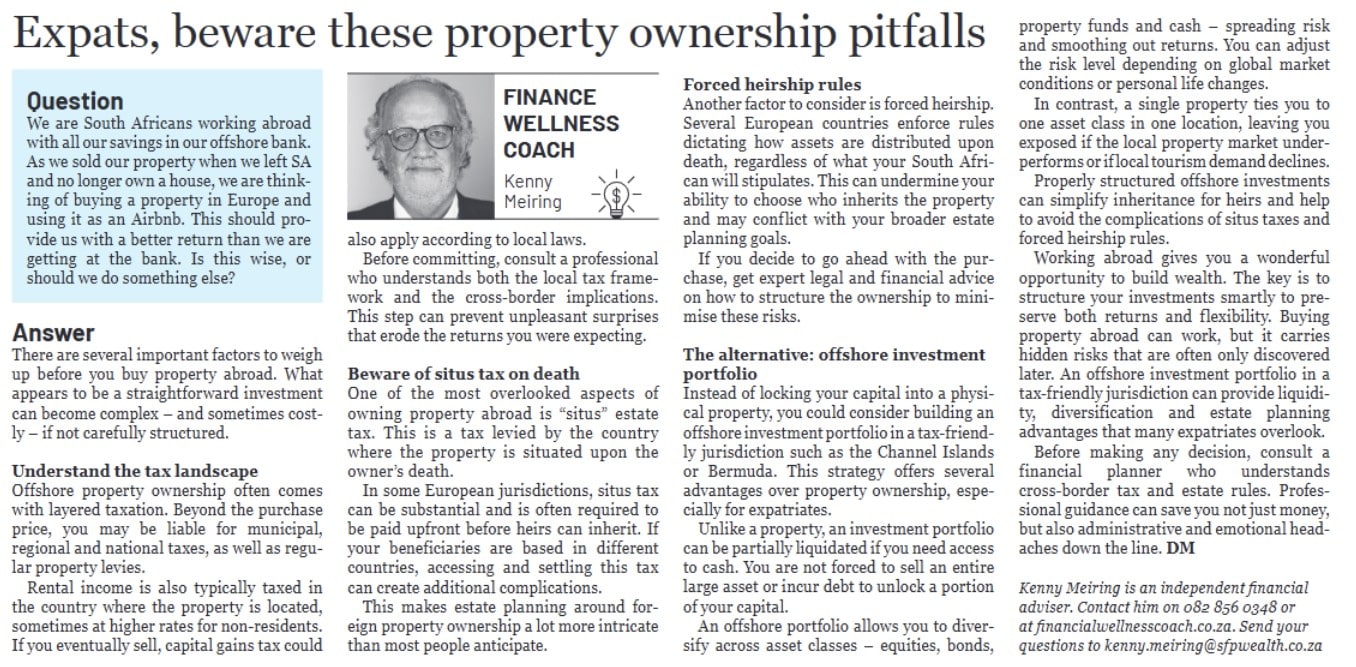No. 217 – Expats, beware these property ownership pitfalls
Question
We are South Africans working abroad with all our savings in our offshore bank. As we sold our property when we left SA and no longer own a house, we are thinking of buying a property in Europe and using it as an Airbnb. This should provide us with a better return than what we are getting at the bank. Is this wise, or should we do something else?
Answer
There are several important factors to weigh up before you buy property abroad. What appears to be a straightforward investment can become complex—and sometimes costly—if not carefully structured.
Understand the Tax Landscape
Offshore property ownership often comes with layered taxation. Beyond the purchase price, you may be liable for municipal, regional, and national taxes, as well as ongoing property levies.
Rental income is also typically taxed in the country where the property is located, sometimes at higher rates for non-residents. If you eventually sell, capital gains tax could also apply according to local laws.
Before committing, consult a professional who understands both the local tax framework and the cross-border implications. This step can prevent unpleasant surprises that erode the returns you were expecting.
Beware of Situs Tax on Death
One of the most overlooked aspects of owning property abroad is “situs” estate tax. This is a tax levied by the country where the property is situated upon the owner’s death.
In some European jurisdictions, situs tax can be substantial and is often required to be paid upfront before heirs can inherit. If your beneficiaries are based in different countries, accessing and settling this tax can create additional complications. This makes estate planning around foreign property ownership a lot more intricate than most people anticipate.
Forced Heirship Rules
Another factor to consider is forced heirship. Several European countries enforce rules dictating how assets are distributed upon death, regardless of what your South African will stipulates. This can undermine your ability to choose who inherits the property and may conflict with your broader estate planning goals.
If you decide to go ahead with the purchase, get expert legal and financial advice on how to structure the ownership to minimize these risks.
The Alternative: Offshore Investment Portfolio
Instead of locking your capital into a physical property, you could consider building an offshore investment portfolio in a tax-friendly jurisdiction such as the Channel Islands or Bermuda. This strategy offers several advantages over property ownership, especially for expatriates.
Liquidity
Unlike a property, an investment portfolio can be partially liquidated if you need access to cash. You are not forced to sell an entire large asset or incur debt to unlock a portion of your capital.
Risk Management
An offshore portfolio allows you to diversify across asset classes—equities, bonds, property funds, and cash—spreading risk and smoothing out returns. You can adjust the risk level depending on global market conditions or personal life changes. In contrast, a single property ties you to one asset class in one location, leaving you exposed if the local property market underperforms or if local tourism demand declines.
Ease of Inheritance
Properly structured offshore investments can simplify inheritance for heirs and help avoid the complications of situs taxes and forced heirship rules.
Working abroad gives you a wonderful opportunity to build wealth. The key is to structure it smartly to preserve both returns and flexibility. Buying property abroad can work, but it carries hidden risks that are often only discovered later. An offshore investment portfolio in a tax-friendly jurisdiction can provide liquidity, diversification, and estate planning advantages that many expatriates overlook.
Before making any decision, consult a financial planner who understands cross-border tax and estate rules. Professional guidance here can save you not just money, but also administrative and emotional headaches down the line.
KENNY MEIRING IS AN INDEPENDENT FINANCIAL ADVISER
Contact him via phone, email or via contact phone on the financialwellnesscoach.co.za website

Read more of our articles on the Daily Maverick website or newspaper weekly!

